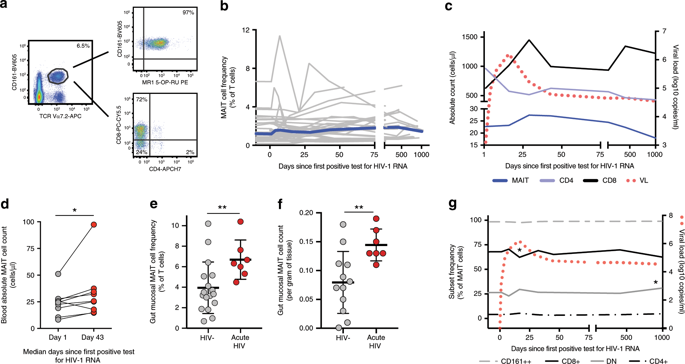当前位置:
X-MOL 学术
›
Nat. Commun.
›
论文详情
Our official English website, www.x-mol.net, welcomes your
feedback! (Note: you will need to create a separate account there.)
Dynamic MAIT cell response with progressively enhanced innateness during acute HIV-1 infection.
Nature Communications ( IF 14.7 ) Pub Date : 2020-01-14 , DOI: 10.1038/s41467-019-13975-9 Kerri G Lal 1, 2, 3 , Dohoon Kim 1, 2 , Margaret C Costanzo 1, 2 , Matthew Creegan 1, 2 , Edwin Leeansyah 3, 4 , Joana Dias 3 , Dominic Paquin-Proulx 1, 2 , Leigh Anne Eller 1, 2 , Alexandra Schuetz 1, 2, 5 , Yuwadee Phuang-Ngern 5 , Shelly J Krebs 1, 2 , Bonnie M Slike 1, 2 , Hannah Kibuuka 6 , Lucas Maganga 7 , Sorachai Nitayaphan 8 , Josphat Kosgei 9 , Carlo Sacdalan 10 , Jintanat Ananworanich 1, 2, 10 , Diane L Bolton 1, 2 , Nelson L Michael 1 , Barbara L Shacklett 11 , Merlin L Robb 1, 2 , Michael A Eller 1, 2 , Johan K Sandberg 3
Nature Communications ( IF 14.7 ) Pub Date : 2020-01-14 , DOI: 10.1038/s41467-019-13975-9 Kerri G Lal 1, 2, 3 , Dohoon Kim 1, 2 , Margaret C Costanzo 1, 2 , Matthew Creegan 1, 2 , Edwin Leeansyah 3, 4 , Joana Dias 3 , Dominic Paquin-Proulx 1, 2 , Leigh Anne Eller 1, 2 , Alexandra Schuetz 1, 2, 5 , Yuwadee Phuang-Ngern 5 , Shelly J Krebs 1, 2 , Bonnie M Slike 1, 2 , Hannah Kibuuka 6 , Lucas Maganga 7 , Sorachai Nitayaphan 8 , Josphat Kosgei 9 , Carlo Sacdalan 10 , Jintanat Ananworanich 1, 2, 10 , Diane L Bolton 1, 2 , Nelson L Michael 1 , Barbara L Shacklett 11 , Merlin L Robb 1, 2 , Michael A Eller 1, 2 , Johan K Sandberg 3
Affiliation

|
Mucosa-associated invariant T (MAIT) cell loss in chronic HIV-1 infection is a significant insult to antimicrobial immune defenses. Here we investigate the response of MAIT cells during acute HIV-1 infection utilizing the RV217 cohort with paired longitudinal pre- and post-infection samples. MAIT cells are activated and expand in blood and mucosa coincident with peak HIV-1 viremia, in a manner associated with emerging microbial translocation. This is followed by a phase with elevated function as viral replication is controlled to a set-point level, and later by their functional decline at the onset of chronic infection. Interestingly, enhanced innate-like pathways and characteristics develop progressively in MAIT cells during infection, in parallel with TCR repertoire alterations. These findings delineate the dynamic MAIT cell response to acute HIV-1 infection, and show how the MAIT compartment initially responds and expands with enhanced function, followed by progressive reprogramming away from TCR-dependent antibacterial responses towards innate-like functionality.
中文翻译:

在急性 HIV-1 感染期间具有逐渐增强的先天性的动态 MAIT 细胞反应。
慢性 HIV-1 感染中的黏膜相关不变 T (MAIT) 细胞丢失是对抗菌免疫防御的重大损害。在这里,我们利用 RV217 队列与成对的纵向感染前和感染后样本研究 MAIT 细胞在急性 HIV-1 感染期间的反应。MAIT 细胞在血液和黏膜中被激活并在 HIV-1 病毒血症高峰期扩张,其方式与新出现的微生物易位有关。随后是一个功能升高的阶段,因为病毒复制被控制在设定点水平,然后在慢性感染开始时它们的功能下降。有趣的是,增强的先天样途径和特征在感染期间在 MAIT 细胞中逐渐发展,与 TCR 库的改变平行。
更新日期:2020-01-14
中文翻译:

在急性 HIV-1 感染期间具有逐渐增强的先天性的动态 MAIT 细胞反应。
慢性 HIV-1 感染中的黏膜相关不变 T (MAIT) 细胞丢失是对抗菌免疫防御的重大损害。在这里,我们利用 RV217 队列与成对的纵向感染前和感染后样本研究 MAIT 细胞在急性 HIV-1 感染期间的反应。MAIT 细胞在血液和黏膜中被激活并在 HIV-1 病毒血症高峰期扩张,其方式与新出现的微生物易位有关。随后是一个功能升高的阶段,因为病毒复制被控制在设定点水平,然后在慢性感染开始时它们的功能下降。有趣的是,增强的先天样途径和特征在感染期间在 MAIT 细胞中逐渐发展,与 TCR 库的改变平行。











































 京公网安备 11010802027423号
京公网安备 11010802027423号